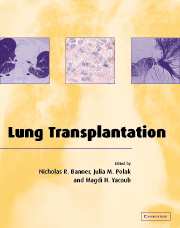Book contents
- Frontmatter
- Contents
- List of contributors
- Preface
- Part I Pulmonary disease
- 1 Primary pulmonary hypertension: pathophysiology and therapy
- 2 Genetics of pulmonary hypertension
- 3 Pathology of pulmonary hypertension
- 4 Pulmonary hypertension and the right ventricle
- 5 Emphysema
- 6 Alpha-1-antitrypsin deficiency
- 7 Bronchiectasis
- 8 Cystic fibrosis
- 9 Diffuse lung disease
- 10 Explant pathology
- Part II Lung transplantation
- Part III Future directions
- Index
10 - Explant pathology
Published online by Cambridge University Press: 06 January 2010
- Frontmatter
- Contents
- List of contributors
- Preface
- Part I Pulmonary disease
- 1 Primary pulmonary hypertension: pathophysiology and therapy
- 2 Genetics of pulmonary hypertension
- 3 Pathology of pulmonary hypertension
- 4 Pulmonary hypertension and the right ventricle
- 5 Emphysema
- 6 Alpha-1-antitrypsin deficiency
- 7 Bronchiectasis
- 8 Cystic fibrosis
- 9 Diffuse lung disease
- 10 Explant pathology
- Part II Lung transplantation
- Part III Future directions
- Index
Summary
Introduction
Lung transplantation is now a well-established successful surgical treatment for a range of pulmonary diseases for which no alternative therapies exist in the advanced stages [1]. Lung transplantation can take the form of combined heart–lung, bilateral or single lung grafts and is performed for four main categories of lung disease. These are obstructive, restrictive, suppurative and vascular diseases, the latter including both primary and secondary causes [1]. Lung transplantation has enabled the surgical pulmonary pathologist to study whole lungs without the superimposed agonal complications seen in autopsy specimens. The availability of these fresh lungs has proved a valuable resource for research into a range of pulmonary diseases as well as allowing detailed his to pathological study. Lung transplantation has also promoted interest in so called ‘end-stage’ lung diseases, with a greater drive for accurate diagnosis before referral for assessment of potential candidates [2–5]. This chapter examines aspects of the impact of lung transplantation on the diagnosis of pulmonary conditions and research into their aetiology encouraged by this material.
Accuracy of referral diagnosis
Diagnosis of parenchymal lung disease prior to referral for transplantation will have been made on clinical, radiological and/or histopathological criteria. Some patients may have had biopsy material in the form of transbronchial or open lung samples but this may have been obtained relatively late in the course of the disease when specific features are no longer present. Examination of the explanted lungs has enabled more accurate diagnoses to be made in many cases and effectively constitutes an audit of the thoracic medical practice of both the referring and specialist transplant centres.
- Type
- Chapter
- Information
- Lung Transplantation , pp. 96 - 110Publisher: Cambridge University PressPrint publication year: 2003

